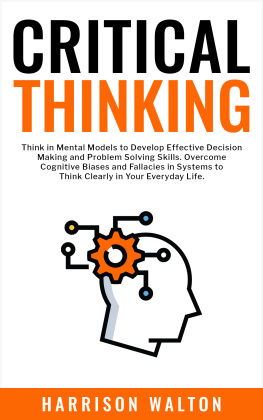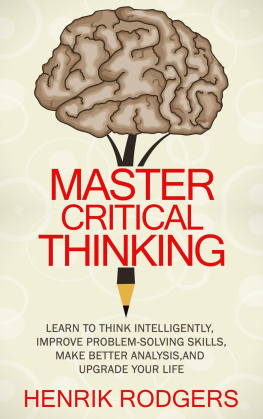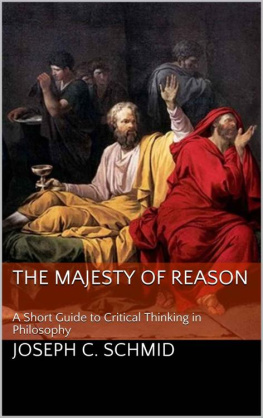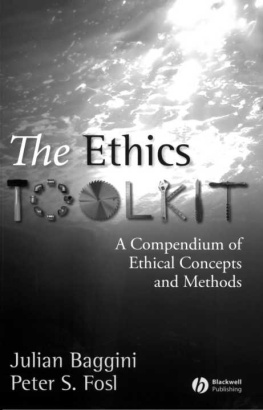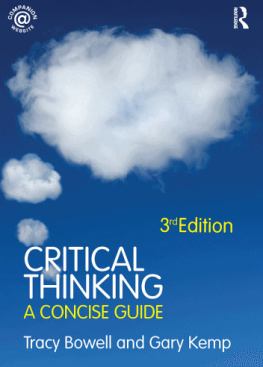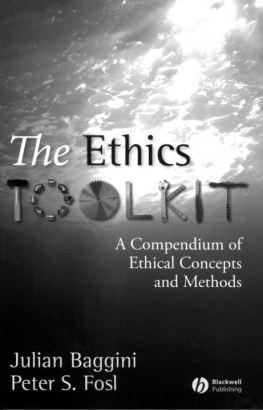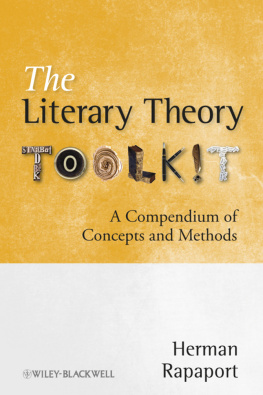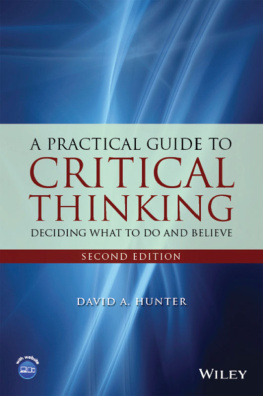
GALEN A. FORESMAN, PETER S. FOSL, AND JAMIE C.WATSON
THE CRITICAL THINKING
TOOLKIT
This edition first published 2017
2017 John Wiley & Sons, Inc.
Registered Office
John Wiley & Sons Ltd, The Atrium, Southern Gate, Chichester, West Sussex, PO19 8SQ, UK
Editorial Offices
350 Main Street, Malden, MA 02148-5020, USA
9600 Garsington Road, Oxford, OX4 2DQ, UK
The Atrium, Southern Gate, Chichester, West Sussex, PO19 8SQ, UK
For details of our global editorial offices, for customer services, and for information about how to apply for permission to reuse the copyright material in this book please see our website at www.wiley.com/wiley-blackwell.
The right of Galen A. Foresman, Peter S. Fosl, and Jamie C. Watson to be identified as the authors of this work has been asserted in accordance with the UK Copyright, Designs and Patents Act 1988.
All rights reserved. No part of this publication may be reproduced, stored in a retrieval system, or transmitted, in any form or by any means, electronic, mechanical, photocopying, recording or otherwise, except as permitted by the UK Copyright, Designs and Patents Act 1988, without the prior permission of the publisher.
Wiley also publishes its books in a variety of electronic formats. Some content that appears in print may not be available in electronic books.
Designations used by companies to distinguish their products are often claimed as trademarks. All brand names and product names used in this book are trade names, service marks, trademarks or registered trademarks of their respective owners. The publisher is not associated with any product or vendor mentioned in this book.
Limit of Liability/Disclaimer of Warranty: While the publisher and authors have used their best efforts in preparing this book, they make no representations or warranties with respect to the accuracy or completeness of the contents of this book and specifically disclaim any implied warranties of merchantability or fitness for a particular purpose. It is sold on the understanding that the publisher is not engaged in rendering professional services and neither the publisher nor the author shall be liable for damages arising herefrom. If professional advice or other expert assistance is required, the services of a competent professional should be sought.
Library of Congress Cataloging-in-Publication Data
Names: Foresman, Galen A., author.
Title: The critical thinking toolkit / Galen A. Foresman, Peter S. Fosl, and Jamie C. Watson.
Description: Hoboken : Wiley, 2016. | Includes bibliographical references and index.
Identifiers: LCCN 2016006532 (print) | LCCN 2016012956 (ebook) | ISBN 9780470659960 (cloth) |
ISBN 9780470658697 (pbk.) | ISBN 9781118982020 (pdf) | ISBN 9781118981993 (epub)
Subjects: LCSH: Reasoning. | Critical thinking. | Logic.
Classification: LCC BC177 .F67 2016 (print) | LCC BC177 (ebook) | DDC 160dc23
LC record available at http://lccn.loc.gov/2016006532
A catalogue record for this book is available from the British Library.
Cover image: Getty/ Lisa Quarfoth
To our students and to the Logos
Acknowledgments
The authors would like to thank in the first place our families for their patience as we labored on this book. Without their support, inspiration, and advice this project would not have come to fruition. In particular, we wish to thank Cate Fosl and Darlena Watson. We are especially grateful to Robert Arp for getting the ball rolling on this project, as well as to editors Jeff Dean and Liam Cooper for making sure it kept rolling.
We thank Julian Baggini, too, for graciously permitting us to extend the Toolkit program to the field of critical thinking and for permitting us to rework material drawn from a number of entries in The Philosopher's Toolkit for this text. We thank Nathan Gray and Nathan Eric Dickman (Young Harris College) as well as Robert Bass (University of North Carolina, Pembroke) for valuable insights and examples. We thank Kevin Decker for his close reading and helpful criticisms. One of the greatest critical thinkers we know, Jamie Miller, offered us helpful advice, pedagogical as well as logical. Cate Fosl (University of Louisville) offered important insights on matters of race and feminism. Jack Furlong and Bob Rosenberg (Transylvania University) helped refine sections dealing with the natural sciences. Alexander Dick (University of British Columbia) advised the authors on topics in critical theory.
We are grateful, too, to the institutions that have supported our academic work: North Carolina Agricultural & Technical State University, Transylvania University, and Broward College. We are also grateful, more generally, for the continued existence of institutions of higher education that sustain the cultivation and communication of critical thinking. Our civilization depends deeply upon those efforts and on the support of donors, governments, and students. The professors who introduced us to logic and critical thinking deserve special acknowledgment, as we recognize that it is most immediately and perhaps most crucially through the efforts of fine teachers such as they are that good, clear, and critical thinking is cultivated in our world and passed on to new generations. Outstanding instruction in logic was afforded to us by Professor Frank Wilson at Bucknell University, by Burke Townsend at the University of Montana, Piers Rawling at Florida State University, and by Michael Bradie at Bowling Green State University. They in turn learned from fine and able teachers and inquirers into logic, epistemology, criticism, the sciences, and psychology in a weave of traditions that stretches back to antiquity. We hope in some small way to carry on those traditions in this volume. Any errors or shortcomings it presents are wholly our own.
Wiley deserves our deep gratitude not only for publishing our work but also for advancing and sustaining thoughtful publications at a time when doing so is increasingly complex and difficult. No book produced through a fine publisher is realized without the guidance of its editors, and we have been especially fortunate in the editing provided by Alison Kostka, Liam Cooper, and Sally Cooper. We are grateful for the keen eyes and good judgment of copy editor Fiona Screen and proofreader Helen Kemp, for the talents of the artists who produced the book's cover, as well as for the marketing and distribution teams that have made this text available to readers. We salute you all!
Introduction
The Very Idea of Critical Thinking
Critical thinking sometimes seems as if it needs an apology, or rather it seems itself to be a kind of apology, an apology for the humanities and the liberal arts and sciences generally. Having failed to convince many people that the liberal arts are simply good in themselves or in their own terms, academics sometimes seem as though they have concocted the meretricious idea of critical thinking in order to help higher education sell itself to the worlds of commerce, law, and politics. Instead of arguing that the liberal arts comprise some of the very best ways to spend a human life, period (and that we ought, therefore, to support them enthusiastically and share them as widely as possible), academics seem inclined to wave the flag of critical thinking to convince governments, parents, students, and donors that the liberal arts offer something that's useful or profitable in the real world.
Next page

